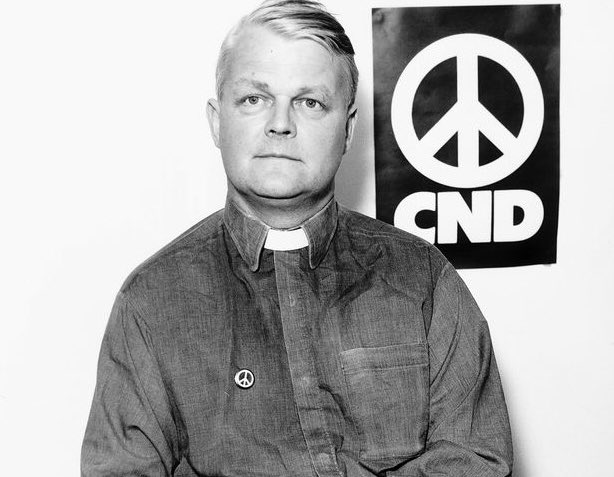
Tank officer, Catholic monsignor, head of the British Campaign for Nuclear Disarmament 1980-1985.
In 1973, while serving as a Catholic priest, Bruce Kent performed a formal exorcism of the Faslane nuclear submarine base. (No uploads of the photos unfortunately.)
Kent strikes me as a model activist of a certain kind - highly invested in symbolism, in consciousness raising - a single issue politician - an agent in great stories and fine speeches. Clearly a good person. But to what end?
During his tenure at CND, membership increased tenfold - mostly due to the coming of Trident and the associated massive spending. "This made it one of the largest political organisations in Britain and probably the largest peace movement in the world (outside the state-sponsored movements of the communist bloc)." He was famous, famous enough that someone sent him a letter bomb.
Wikipedia claims that he was forced to resign from the priesthood for being too political, though this doesn't match his own description of events.
He also signed on to Compassion in World Farming, why not.
Two cheers
CND was the first mass movement against x-risk. (Currently our best guess is that nuclear x-risk is relatively small, but this isn't obvious now and was far from obvious then.)
But it's not enough to have the right cause: you need to get the intervention right too. CND are most famous for pushing unilateral disarmament for the UK. Insofar as this push has a theory of change, it's something like inspiring other countries to unilaterally disarm (moving the world to a Kantian equilbrium).
On the face of it, this is unlikely to work; nonviolent protest only works if your opponents have scruples and/or if the opinion of the world matters to them. Some part of the push will be the classic desire for clean hands, rather than a real plan to reduce x-risk. (He's been called a useful idiot, but this doesn't seem fair either.)
"Peace, not war". Well, yes. It would be nice if moving in a straight line, leading by example were the way to get there, and I don't know that it isn't, but trying it is very hazardous.
Misc
- It's always difficult to evaluate impact. But the direct action and consciousness raising groups are the worst, because they won't even make up numbers for what they've done, besides the odd headcount at a march. I've spent 20 minutes trying to work out what Pax Christi, one of his other organisations, do. I think it's meetings.
- I haven't tried to look at CND's impact through direct action, for instance (before Kent's time) their exposing the emergency backup plan for post-apocalyptic UK government. Which seems pretty bad! But in general I think direct action has a place and I hope someone does a full accounting.
- "Bruce’s razor-sharp intellect, together with his humour, tireless work, intolerance of flannel, and total commitment to his faith and principles, made him a leader of our movement beyond compare" (I have learned a new sense of flannel, though I liked it better when I misread it.)

Literally everyone knows he was the Masculine Mongoose. Superheros don’t even try to hide their identity any more.
After witnessing a few mass protest awareness-raising type movements in my country, I agree that they're not usually helpful. Though at least one of those here was apparently able to effect major government policy.
I do have a couple questions:
Why do you think it's hazardous?
Why is it bad?
Naively, UK disarmament in 1980 would have done one of two things 1) given the Soviets under Brezhnev much more power, lengthening the cold war and producing unknown effects on reform; or 2) forced even more US nuclear deployment in European bases, forcing a response from the Soviets, and so destabilising the world. (As I say, there's a chance that it could instead have lead to a better equilibrium, but I can't see why anyone would think this was the most likely outcome.)
If the locations of your post-nuke decentralised government are known, then they can be targeted by nukes.